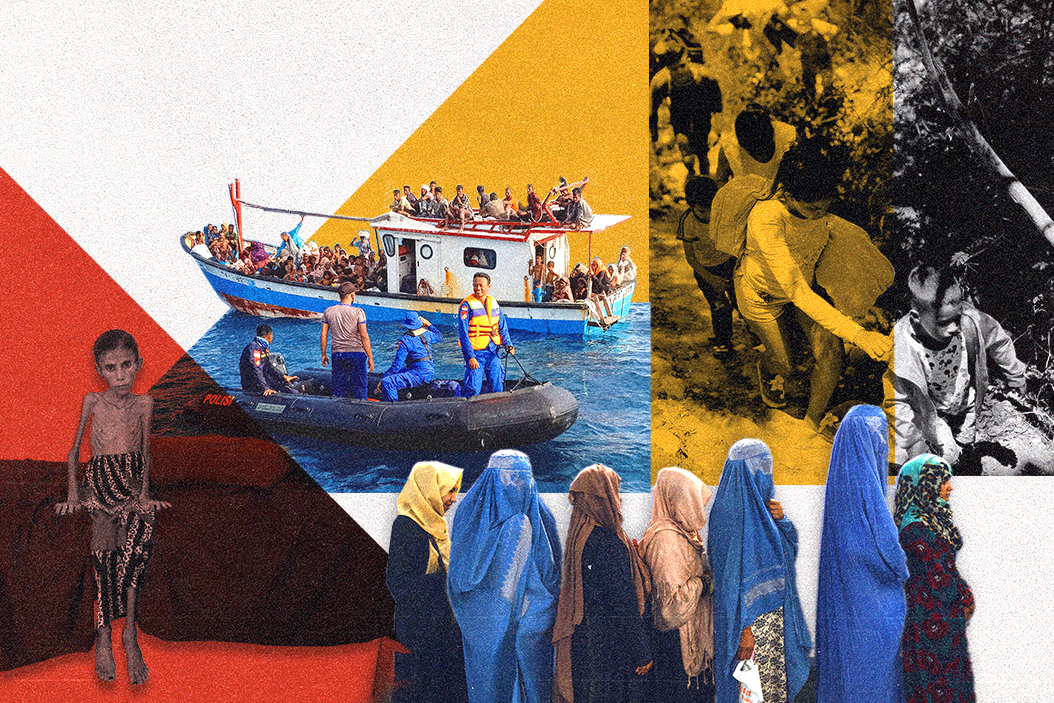A handful of stories – the war in Ukraine, China’s zero-COVID policy, and US elections – have dominated much of the media coverage this year. Meanwhile, many other crucial global stories have been woefully undercovered. We take a look at four of them.
Venezuela: The challenge of migrating again
Since strongman President Nicolás Maduro responded with an iron fist to widespread protests in 2014 over shortages of goods and sky-high inflation, Venezuela has been subject to more severe US economic sanctions that have put its already-struggling economy on life support. (One of the first sanctions was imposed by the Bush administration in 2006 over Caracas’ failure to crack down on drug trafficking and terrorism.)
As a result of the economic and political crises gripping the country, more than 7 million Venezuelans have fled since 2015, making it one of the world’s largest migrant crises. For those who stayed behind, their quality of life is abysmal: Joblessness is rife, the medical system is in tatters, and more than 67% live in extreme poverty. Meanwhile, most of those who fled sought refuge in Latin America, mainly in Colombia, where they have struggled to find jobs – forcing many women to resort to sex work or even to sell their hair to survive.
But 2022 brought fresh challenges for Venezuela's migrant population. Global inflation has disrupted Latin America’s gig economy, which many Venezuelan migrants rely on to get by. As a result, thousands have been forced to uproot their lives – again – resulting in new migration routes to North America.
Consider that in the first 10 months of this year, Venezuelans accounted for 70% of people who trekked through the Darien Gap, a perilous crossing between Colombia and Panama that’s submerged in dense jungle and swarming with drug cartels and guerrilla groups. The US recently lifted some sanctions on Venezuela's oil sector in a bid to offset losses from Russia. But Washington is still a long way off from reaching any agreements with the Maduro regime that would rescue Caracas’ economy.
Afghanistan: No reprieve for Afghan women
If 2022 was the year that the world stood with Ukraine, then 2021 was about standing with the people of Afghanistan after the Taliban swept to power at lightning speed.
At the time, Taliban officials said they would safeguard women’s “Islamic right” to study and work. But unsurprisingly, 18 months later that message has proven hollow. Life under Taliban rule has again proven intolerable for Afghans, particularly for women and girls. The Taliban has banned girls aged 13-18 from attending school, and more recently forbid women from attending university, prompting sporadic protests. Women have also been banned from working for nongovernment organizations, while public spaces in Kabul, the capital, are also off limits to Afghan women.
What’s more, Afghanistan’s economy is in tatters as the Taliban remains cut off from the bulk of its foreign reserves, which are mostly held in US banks. As a result, food insecurity is widespread, and the security situation is also spiraling as ISIS-K, a Taliban rival, feels emboldened to wreak havoc. As long as the Taliban remains in charge, Washington is unlikely to unlock any funds.
Rohingya: Stranded at sea
Around a million Rohingya – a Muslim minority long persecuted by the military and political elite in majority-Buddhist Myanmar – have fled to neighboring Bangladesh since 2017, after Myanmar’s military perpetrated a massacre against them. Since then, Rohingya refugees have languished in squalid conditions in Cox’s Bazar, a sprawling tent city for refugees, where violence, gang rape, and murder are rife.
In the meantime, many Rohingya have preferred to try their luck at sea, getting into rickety boats in hopes of reaching Malaysia, which opened its borders to stateless Rohingya in 2016. But 2022 has proven one of the deadliest years at sea for the Rohingya, according to the UN. Case in point: For more than a month, a vessel with at least 160 Rohingya aboard, including children who have gone weeks without food, was stranded in the Andaman Sea, while another is presumed to have sunk earlier this month with 180 Rohingya on board.
Meanwhile, negotiations between the Bangladesh government and Myanmar’s military dictatorship – which resumed earlier this year after a hiatus – on the potential voluntary repatriation of Rohingya have not proven fruitful.
Yemen: The forgotten war
Photos of Yemeni children are difficult to stomach – the protruding ribs and sunken faces. But after eight years of war, we don’t see many of these images in the media these days.
While fighting between the Iran-backed Houthi rebels and the Saudi-backed government ebbed this year as a result of a ceasefire, the two sides failed to reach an agreement in October to extend the truce. Meanwhile, the humanitarian situation remains dire: At least 17 million Yemenis are food insecure, and 2.2 million children under five have required medical care for malnutrition this year.
What’s more, as GZERO's Alex Kliment previously wrote, international attention for Ukraine has drawn humanitarian resources away from Yemen, making it harder to finance aid missions there. As of October, just 47% of the UN-led Humanitarian Response Plan for Yemen had been funded by the international community. With longtime land and sea blockades preventing humanitarian shipments, stalemate remains the most likely scenario in 2023.
